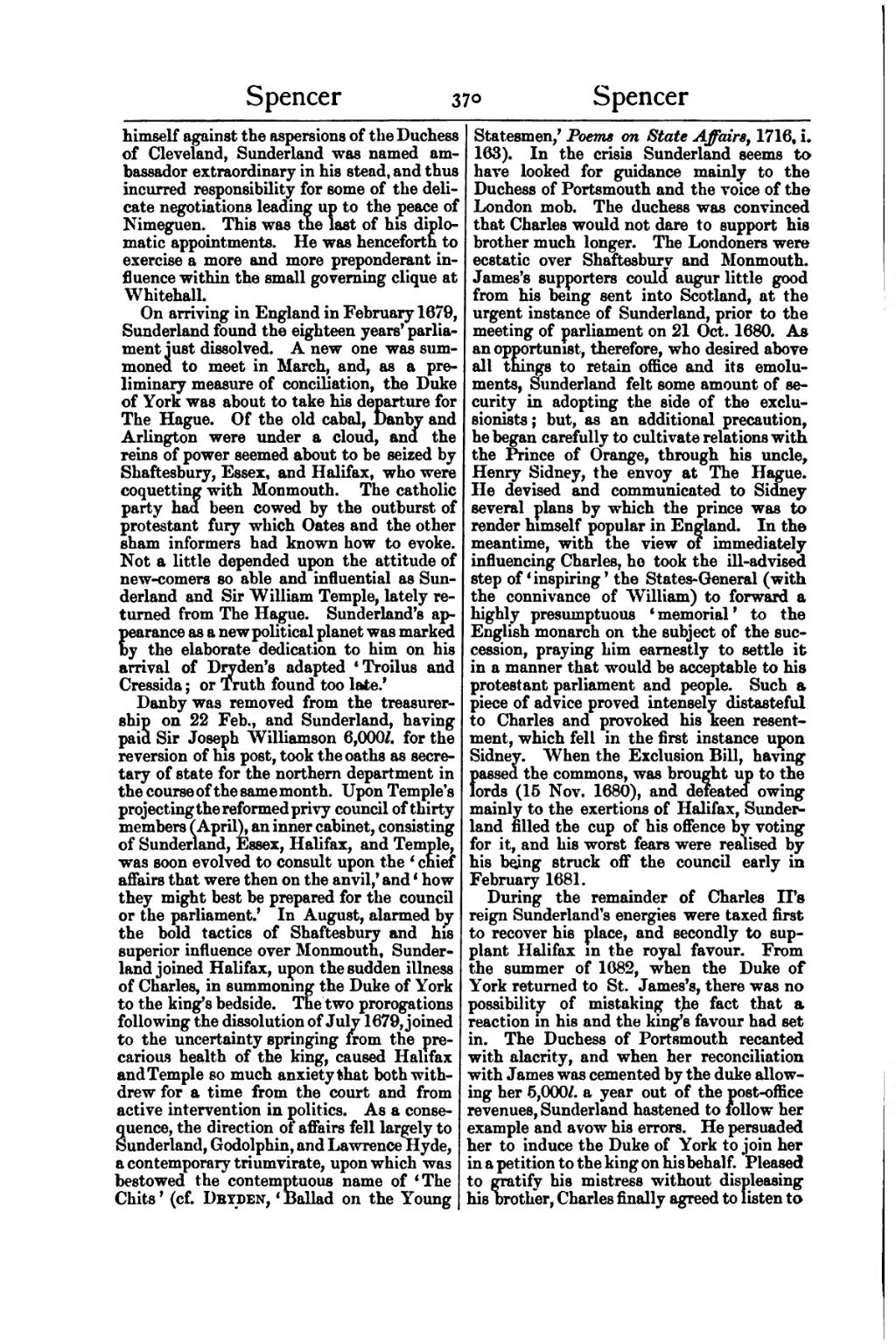himself against the aspersions of the Duchess of Cleveland, Sunderland was named ambassador extraordinary in his stead, and thus incurred responsibility for some of the delicate negotiations leading up to the peace of Nimeguen. This was the last of his diplomatic appointments. He was henceforth to exercise a more and more preponderant influence within the small governing clique at Whitehall.
On arriving in England in February 1679, Sunderland found the eighteen years' parliament just dissolved. A new one was summoned to meet in March, and, as a preliminary measure of conciliation, the Duke of York was about to take his departure for The Hague. Of the old cabal, Danby and Arlington were under a cloud, and the reins of power seemed about to be seized by Shaftesbury, Essex, and Halifax, who were coquetting with Monmouth. The catholic party had been cowed by the outburst of protestant fury which Oates and the other sham informers had known how to evoke. Not a little depended upon the attitude of newcomers so able and influential as Sunderland and Sir William Temple, lately returned from The Hague. Sunderland's appearance as a new political planet was marked by the elaborate dedication to him on his arrival of Dryden's adapted ‘Troilus and Cressida; or Truth found too late.’
Danby was removed from the treasurership on 22 Feb., and Sunderland, having paid Sir Joseph Williamson 6,000l. for the reversion of his post, took the oaths as secretary of state for the northern department in the course of the same month. Upon Temple's projecting the reformed privy council of thirty members (April), an inner cabinet, consisting of Sunderland, Essex, Halifax, and Temple, was soon evolved to consult upon the ‘chief affairs that were then on the anvil,’ and ‘how they might best be prepared for the council or the parliament.’ In August, alarmed by the bold tactics of Shaftesbury and his superior influence over Monmouth, Sunderland joined Halifax, upon the sudden illness of Charles, in summoning the Duke of York to the king's bedside. The two prorogations following the dissolution of July 1679, joined to the uncertainty springing from the precarious health of the king, caused Halifax and Temple so much anxiety that both withdrew for a time from the court and from active intervention in politics. As a consequence, the direction of affairs fell largely to Sunderland, Godolphin, and Lawrence Hyde, a contemporary triumvirate, upon which was bestowed the contemptuous name of ‘The Chits’ (cf. Dryden, ‘Ballad on the Young Statesmen,’ Poems on State Affairs, 1716, i. 163). In the crisis Sunderland seems to have looked for guidance mainly to the Duchess of Portsmouth and the voice of the London mob. The duchess was convinced that Charles would not dare to support his brother much longer. The Londoners were ecstatic over Shaftesbury and Monmouth. James's supporters could augur little good from his being sent into Scotland, at the urgent instance of Sunderland, prior to the meeting of parliament on 21 Oct. 1680. As an opportunist, therefore, who desired above all things to retain office and its emoluments, Sunderland felt some amount of security in adopting the side of the exclusionists; but, as an additional precaution, he began carefully to cultivate relations with the Prince of Orange, through his uncle, Henry Sidney, the envoy at The Hague. He devised and communicated to Sidney several plans by which the prince was to render himself popular in England. In the meantime, with the view of immediately influencing Charles, he took the ill-advised step of ‘inspiring’ the States-General (with the connivance of William) to forward a highly presumptuous ‘memorial’ to the English monarch on the subject of the succession, praying him earnestly to settle it in a manner that would be acceptable to his protestant parliament and people. Such a piece of advice proved intensely distasteful to Charles and provoked his keen resentment, which fell in the first instance upon Sidney. When the Exclusion Bill, having passed the commons, was brought up to the lords (15 Nov. 1680), and defeated owing mainly to the exertions of Halifax, Sunderland filled the cup of his offence by voting for it, and his worst fears were realised by his being struck off the council early in February 1681.
During the remainder of Charles II's reign Sunderland's energies were taxed first to recover his place, and secondly to supplant Halifax in the royal favour. From the summer of 1682, when the Duke of York returned to St. James's, there was no possibility of mistaking the fact that a reaction in his and the king's favour had set in. The Duchess of Portsmouth recanted with alacrity, and when her reconciliation with James was cemented by the duke allowing her 5,000l. a year out of the post-office revenues, Sunderland hastened to follow her example and avow his errors. He persuaded her to induce the Duke of York to join her in a petition to the king on his behalf. Pleased to gratify his mistress without displeasing his brother, Charles finally agreed to listen to
